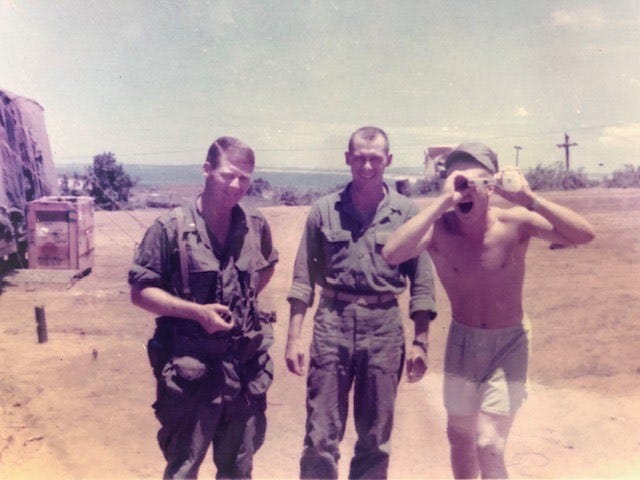I Remember Buddy
Nonfiction by James J. Kirschke. “Well, now that I am blind, when I go out to supper with my wife and children, the waiter or waitress always asks my wife . . . what I would like to eat."

When Buddy Spivey was wheeled into my room on the twelfth deck of the Sick Officers Quarters at the Philadelphia Naval Hospital in 1967, all I could see through the open port between us was the outline of a body under a bed sheet. I didn’t know his name or how he’d been injured or where. I knew only that he lay very still and silent.
Soon after, I heard he was in a coma and not expected to survive. When I finally learned his name, I realized I’d seen him before. It was back in 1965 at Camp Pendleton, where I was a First Lieutenant training with the First Marine Division in preparation for shipping out to Vietnam. I’d been heading out for a run one morning and happened to see a fellow lieutenant standing outside the TOQ, talking to another officer about the Arkansas Razorbacks. He had his thumbs tucked under his belt loops and spoke in a twang that bounced like a rubber ball.
I had hardly gotten to know him back then nor had I seen him again until he appeared in my hospital room. It wasn’t unusual in those days to see a man during training and never see him again, never know whether he’d been killed or wounded somewhere in-country. Nor was it unusual to see someone fighting beside you in the field be wounded and flown out and to never know his fate. Casualties came and went, but the important business, the immediate electrifying concern in the war zone, was always with the current moment.
As Buddy lay in a coma, I, too, was struggling to survive. In January 1967, after ten months leading platoons through the badlands up near the DMZ, I’d been gravely wounded by a landmine. I had lost both my legs to amputations, had sustained other serious wounds and was just this side of dead when they shipped my eighty-five pounds of skin and bones back home. It would be the start of fourteen months of recovery at USNH, where five roommates would come into my life and leave again.
As was the case on a ward like ours, young men were fighting to survive not just their injuries but the disappointments, regrets, and fears that came with being disabled for life. Sticking together and helping each other pull through made all the difference. Buddy was the one who helped me the most in that grueling and uncertain time. And he would go on to be a source of inspiration to me through the rest of my life.
Keep reading with a 7-day free trial
Subscribe to Consequence to keep reading this post and get 7 days of free access to the full post archives.

